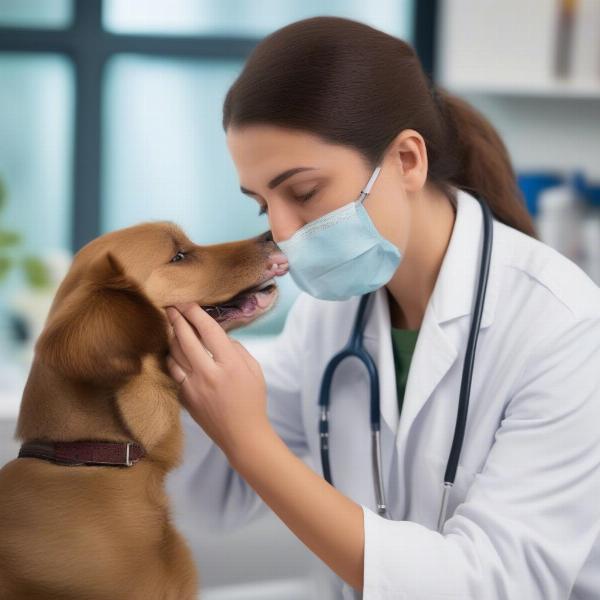Rawhide chews have been a popular dog treat for years, but many pet owners are now seeking rawhide-free alternatives due to potential health risks. Understanding the benefits of rawhide-free chews is crucial for responsible pet ownership. This article will guide you through the world of dog chews, highlighting the dangers of rawhide and showcasing the numerous safe and enjoyable rawhide-free options available.
Why Choose Rawhide-Free Dog Chews?
Rawhide is made from the inner layer of cow or horse hides. The processing often involves chemicals like formaldehyde and bleach, which can be harmful if ingested. Additionally, rawhide can pose choking hazards and digestive issues. Rawhide-free chews offer a healthier and safer alternative for your furry friend. They come in various forms, from natural wood chews to durable synthetic options, catering to every dog’s chewing style and preference.
Benefits of Rawhide-Free Chews
Choosing rawhide-free chews offers several key advantages:
- Improved Dental Health: Many rawhide-free chews are designed to promote dental hygiene by scraping away plaque and tartar as your dog chews.
- Safer Ingredients: Rawhide-free chews often utilize natural and easily digestible ingredients, reducing the risk of stomach upset and allergic reactions.
- Reduced Choking Hazard: Many rawhide-free chews are designed to break down more easily than rawhide, minimizing the risk of choking.
- Longer-lasting Entertainment: Some rawhide-free chews, like nylon bones, are incredibly durable and provide hours of chewing enjoyment.
Types of Rawhide-Free Dog Chews
A wide variety of rawhide-free chews are available to cater to different dog breeds, sizes, and chewing habits. Here are some popular choices:
- Bully Sticks: Made from beef pizzle, bully sticks are a natural and highly digestible chew.
- Sweet Potato Chews: These chews are made from dehydrated sweet potatoes, providing a healthy and flavorful treat.
- Antlers: Deer and elk antlers are naturally shed and offer a long-lasting and satisfying chew.
- Nylon Bones: These durable chews are designed for aggressive chewers and come in various flavors and textures.
- Dental Chews: Specifically designed to promote dental health, these chews often have ridges and textures that help clean teeth.
Choosing the Right Rawhide-Free Chew for Your Dog
When selecting a rawhide-free chew, consider your dog’s size, age, and chewing habits. Choose a chew that is appropriately sized to prevent choking hazards. For aggressive chewers, opt for durable options like nylon bones or antlers. Puppies and senior dogs may benefit from softer chews like sweet potato or dental chews. Always supervise your dog when they are chewing on any treat.
What if My Dog Swallows a Piece of Rawhide-Free Chew?
While rawhide-free chews are generally safer than rawhide, it’s still important to choose appropriate sizes and supervise your dog. If your dog swallows a large piece, monitor them for any signs of distress, such as vomiting, diarrhea, or loss of appetite. Contact your veterinarian immediately if you notice any unusual symptoms.
 Veterinarian examining a dog
Veterinarian examining a dog
Conclusion
Switching to rawhide-free chews is a simple but effective way to enhance your dog’s safety and overall well-being. With a vast array of options available, you can find the perfect chew to satisfy your dog’s natural chewing instincts while promoting their dental health and providing hours of enjoyment. By making the switch, you’re investing in a happier, healthier future for your beloved companion.
FAQ
- Are all rawhide-free chews completely digestible? While many are highly digestible, some, like antlers, are designed to slowly wear down rather than be fully digested.
- How do I know which rawhide-free chew is right for my dog? Consider your dog’s size, age, and chewing strength. Consult your veterinarian for personalized recommendations.
- Can puppies have rawhide-free chews? Yes, but choose softer options specifically designed for puppies.
- Are rawhide-free chews more expensive than rawhide? They can be, but the benefits of improved safety and health often outweigh the cost difference.
- Where can I buy rawhide-free dog chews? Pet stores, online retailers, and even some grocery stores carry a variety of rawhide-free chews.
- What are the signs of a dog choking on a chew? Gagging, pawing at the mouth, difficulty breathing, and bluish gums are all signs of choking.
- How often should I give my dog a rawhide-free chew? This depends on the type of chew and your dog’s individual needs. Consult your veterinarian for guidance.
ILM Dog is a leading international online resource dedicated to providing expert advice on dog care and well-being. From breed selection to health and nutrition, ILM Dog offers a comprehensive guide for dog owners worldwide. We provide reliable, practical information covering all aspects of dog care, including choosing the right best dog toys for siberian huskies, building a secure dog enclosure roof, and understanding the regulations for do you have to have a license to groom dogs. For professional dog walking and boarding services, check out our resources on good dog boarding & walks. Additionally, we offer expert insights into creating comfortable and safe outdoor dog shelter. For any inquiries, please contact us at [email protected] or call us at +44 20-3965-8624.